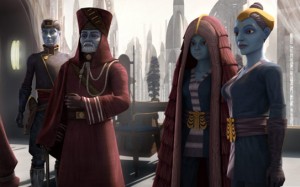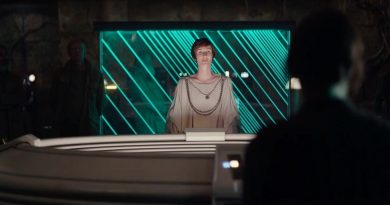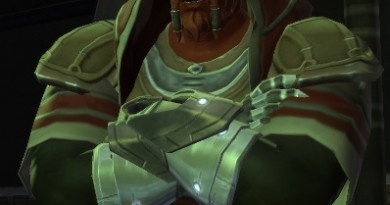Heiress to the Throne?
A recent episode of The Clone Wars was so remarkable I felt inspired to write about it. At first I had in mind a review, praising the many things the episode did well. Thinking over what I wanted to say, though, I realized so many of my thoughts centered on the episode’s author that I wasn’t forming a review, but rather some excited fangirl speculation.

So what exactly has gotten me so inspired? The particular episode that has made an impression was “Assassin”, Season 3, Episode 7. In case you aren’t following the cartoons closely, it was written by Katie Lucas. And yes, she’s George Lucas’ daughter.
When the episode first aired, I remember being a bit overwhelmed by the cinematic caliber of the achievements within the 22-minute cartoon. Lucasfilm has always been known for pushing the limits of technology in pursuit of newer and better ways to impart George Lucas’ vision. The visuals in “Assassins” were stunning on any number of levels, from the broad panoramic shots of Alderaan and Coruscant to the intricacies of Ahsoka’s facial expressions and body movements. Coupled with the clever use of music from the movies – you’ll hear Leia’s Theme as Padmé’s ship lands on Alderaan, for instance – the cartoon format is quickly becoming as strong a medium for telling stories as live-action Star Wars.
Setting all the animation achievements aside, each episode of the cartoon still has to tell a story, and just like her hometown San Francisco Giants, Katie Lucas hit this one out of the park. Aside from a few stilted dialogue passages reminiscent of her father’s notorious odd turns of phrase, the interaction between the three female leads in this episode plays out with such realism that you forget it took a combination of actresses in a recording booth and animators locked up in a studio, who may never see each other face-to-face, to create drama and emotion on this scale.
One of the best parts of Katie’s story is that it’s an equal opportunity production. The villainous lead Aurra Sing is chilling and ruthless, so much so that a Jedi fears her abilities and talent. But it is the courage and inner fortitude of the two heroines in the face of Sing’s deadly pursuit that makes “Assassin” so powerful.
Ahsoka’s struggle with visions of a possible future weaves seamlessly into some of the most iconic moments of the Prequel Trilogy (PT). From her uneasy meeting with Yoda where she seeks guidance about how to cope with an unseen, looming threat to her dashing charge into the Senator’s bedroom to protect Padmé from a Force-sensed attacker, Katie draws direct parallels to Anakin’s own quest to keep Padmé alive. The possibilities for this dynamic going forward with Anakin and Ahsoka are ripe with potential. We’re left wondering how his apprentice’s foresight, and the outcome to her choices, might eventually effect Anakin Skywalker’s own motivations when he falls to the dark side.
At the same time, “Assassin” also promises that TCW may be beginning to flesh out Padmé as fans have hoped she existed in George Lucas’ head. Rightfully the PT movies are Anakin’s tale, and for that reason, detailing Padmé’s heroism has to play a secondary role, sometimes even left mostly off-screen. TCW isn’t bound by those same storytelling limitations, though, and in a somber yet beautiful scene aboard the Senator’s ship, her character unfolds as a woman who, unbowed by the insecurities of youth and isolation, perseveres for the sake of not just herself but also the oppressed. Despite the demands of her office and the daunting prospect of her possible imminent assassination, Padmé takes time to comfort Ahsoka. In the short span of this episode, we are reminded that while it was the seemingly invincible Jedi Anakin Skywalker who was given the moniker “the Hero with No Fear,” he was the one who succumbed to his inner demons. It is his wife who never allows fear to rule her choices.
For a young woman to create this depth of story early on in her career is remarkable. Being the member of a small inner circle, Katie has the unique advantage of understanding her father’s intentions better than most. While the character of Padmé has existed as a whole, complete entity in George’s fantastical mind, I think that without Katie fleshing her out, the rest of us would never have come to see that character.
For years now there has been speculation by fans – what will happen when George tires of all this? What becomes of the GFFA when he’s gone? Could the infinite range of Star Wars drift over the edge of an event horizon without its creator at the helm? But consider the possibility that George instead has been enjoying Take Your Daughter To Work Day in its extended version, and what we’re seeing unfold before our eyes is the grooming of the new heir to the Lucas throne. This may not be the end, but rather a beginning. Better yet, Katie’s giving us all the signs that she’s not just a Lucas, but an actual Star Wars fan – like us.
Why does this make me particularly excited?
I was raised by two parents who instilled in me the belief that I could be anything. I won’t say I haven’t come across roadblocks or momentary speedbumps as a woman, but I can say that I’ve been given the tools to run around or through them as needed. For instance, it never occurred to me that becoming an engineer was out of the norm for my gender until the day I walked into my first statics class and realized I was outnumbered ten to one.
My good fortune in great parents aside, as I have gotten older and wiser it has become clear to me that many young women weren’t or won’t be so lucky. Some would like to believe we’re more enlightened these days, that gender bias is dead and almost gone. But at least in our entertainment media, more and more signs are pointing toward the fact that it’s not.
Take for instance this recent Newsweek article, which discusses sexism in family films. The number of women driving the “family film bus” is remarkably low. Looking closer at the Star Wars franchise specifically, while the numbers of female fans are proving to be roughly equivalent to male fans, on the creative side the women don’t seem to be getting equal representation. New announcements for Expanded Universe authors are still skewed in favor of male writers. Even with Katie’s participation, the percentage of females as recognized principals for TCW production staff is so low it doesn’t climb out of the single digits.
The Newsweek piece also details statistical data compiled by The Geena Davis Institute, which funds research on gender in entertainment geared toward children. This is the part of the article that bears repeating –
Davis points to studies showing that the more TV a girl watches, the fewer options she believes she has in life, and the more a boy watches, the more his views become sexist. Only 7 percent of directors, 13 percent of writers, and 20 percent of producers in the Annenberg study were female. This is the major reason for the skew. When one or more women are involved in writing, the number of female characters jumps.
As far as I see it, the correlation between strong storytelling in TCW cartoons and Katie Lucas’ participation in her father’s legacy begins to take on even more importance for the future of young female fans. Increasing the numbers of female directors, writers, and producers is important not only for this generation of girls, but also for the boys. In just a couple of years contributing to her father’s franchise, Katie Lucas has added solid stories centered on strong female characters and proved everyone can enjoy them.
We know George Lucas can create smart and self-confident heroines to complement his male leads. His female characters have inspired many women to jump into the scifi genre and garnered life-long fans. The dilemma that faces female fans is that the Star Wars franchise’s creator, and most of his story-generation machine, have found the epic adventures of the male heroes more inspiring. Maybe, though, as fathers who love their daughters often do, he’s found unique fulfillment in watching Katie blossom into a storyteller in her own right. With her perspective added to his own, what he just might also find is that elusive magic needed to capture the imaginations of female fans for years to come.
- Hyperspace Theories: Bad Luck Ghorman - June 2, 2025
- Hyperspace Theories: One Year Later as ANDOR Kicks Off Season Two - May 15, 2025
- REVIEW: Tales of the Underworld - May 4, 2025












Pingback:Tweets that mention Heiress to the Throne? « fangirlblog.com -- Topsy.com
I agree with you that this episode was fantastic, and that Katie is doing a stand-up job playing in the universe her dad left her, while still being deep, thoughtful, and engaging. Actually, there are many days my friends and I constantly say that Clone Wars is, in some ways, surpassing the Prequel Trilogy in writing and caliber, bringing a new level of depth that we’re not accustomed to always being there in the latest few Star Wars films.
As for the studies – it’s often difficult for a male to put themselves into the mindset of a female and feel authentic. I know a few who’ve pulled it off, and they’re a rare gem, but the institute is right, women need to get more involved, and a lot of that is unfortunately still going to be fighting prejudice and fighting for their right to be heard, until everyone in the Industry understands that Hollywood can’t stay an “old boys'” club forever. By and large, one of the biggest stepping stones to all creativity is the fact that old Hollywood producers still have the rights to control many aspiring directors, and as such, they try to do stupid things like have Superman fight a giant spider from space (small Kevin Smith reference there) instead of trust the writers a bit more. And I think women face even more stonewalling from these old men than men do, and I hope that changes within my lifetime – because I also would like to be a director someday.
Thanks for this article, it was well-worth the read.
Well said, Chris. I have an upcoming blog discussing Wonder Woman’s predicament – specifically not getting to the big screen. It ties directly into what you’re saying.